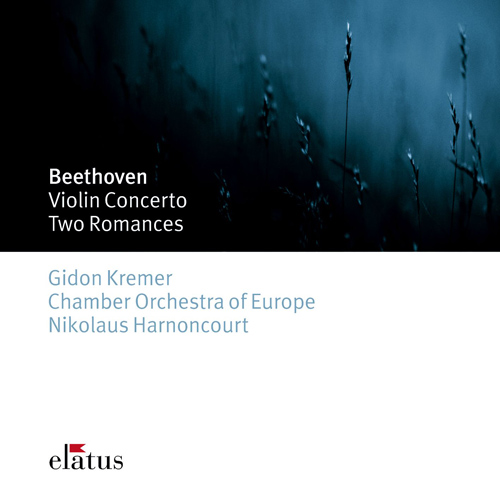Beethoven Works for Violin & Orchestra
View record and artist detailsRecord and Artist Details
Composer or Director: Ludwig van Beethoven
Label: Cala
Magazine Review Date: 12/1993
Media Format: CD or Download
Media Runtime: 55
Mastering:
DDD
Catalogue Number: CACD1013

Tracks:
| Composition | Artist Credit |
|---|---|
| Concerto for Violin and Orchestra |
Ludwig van Beethoven, Composer
Hanover Band Ludwig van Beethoven, Composer Roy Goodman, Conductor Stephanie Chase, Violin |
| Romances |
Ludwig van Beethoven, Composer
Hanover Band Ludwig van Beethoven, Composer Roy Goodman, Conductor Stephanie Chase, Violin |
Composer or Director: Ludwig van Beethoven
Label: Cala
Magazine Review Date: 12/1993
Media Format: Cassette
Media Runtime: 0
Mastering:
DDD
Catalogue Number: CAMC1013

Tracks:
| Composition | Artist Credit |
|---|---|
| Concerto for Violin and Orchestra |
Ludwig van Beethoven, Composer
Hanover Band Ludwig van Beethoven, Composer Roy Goodman, Conductor Stephanie Chase, Violin |
| Romances |
Ludwig van Beethoven, Composer
Hanover Band Ludwig van Beethoven, Composer Roy Goodman, Conductor Stephanie Chase, Violin |
Composer or Director: Ludwig van Beethoven
Label: Teldec (Warner Classics)
Magazine Review Date: 12/1993
Media Format: CD or Download
Media Runtime: 57
Mastering:
DDD
Catalogue Number: 9031-74881-2

Tracks:
| Composition | Artist Credit |
|---|---|
| Concerto for Violin and Orchestra |
Ludwig van Beethoven, Composer
Chamber Orchestra of Europe Gidon Kremer, Violin Ludwig van Beethoven, Composer Nikolaus Harnoncourt, Conductor |
| Romances |
Ludwig van Beethoven, Composer
Chamber Orchestra of Europe Gidon Kremer, Violin Ludwig van Beethoven, Composer Nikolaus Harnoncourt, Conductor |
Author: Edward Greenfield
Now that it has become customary to treat the long first movement as expansively as possible—Chung and Perlman provide outstanding examples—it is particularly refreshing that Kremer takes a much more urgent view. You may find that when he begins the main theme in the coda after the cadenza, he seems too keen to press on, not gentle enough, but that is in character with a strong, yet never wilful or perfunctory view of this vast movement. My distant memory was that the classic versions of the 78 era tended, apart from Heifetz's, to be faster than today's, and it was fascinating to find that Huberman in his 1934 recording (EMI References, 4/90—nla) provides the clearest example, both poetic and urgent in a comparable way to Kremer's. After Kremer's thoughtful and dedicated, slightly understated reading of the slow movement, he and Harnoncourt round the performance off magically with a finale that skips along the more infectiously thanks to light, clean articulation and textures. Traditional performances seem heavyweight by comparison, and there again the period performance on Cala provides a close parallel rather than a contrast.
The controversial point about the Kremer version for some will be the cadenza in the first movement. It is described as by ''Beethoven/Kremer'', for like Wolfgang Schneiderhan in his 1961 DG recording (10/89) he uses a transcription of the big cadenza which Beethoven wrote for his piano arrangement of the work. But where Schneiderhan had the solo violin backed up only by the timpani (just as Beethoven does), Kremer introduces a piano as well. This has the advantage that he can open out the tiny cuts made by Schneiderhan, as well as giving to the piano many of the passages and left-hand accompaniment figures that are ill-suited to the violin. It makes a very long cadenza indeed—five minutes exactly as against 1'45'' for Chase's own cadenza and 3'50'' for Schneiderhan's version of the Beethoven. What Kremer does may seem protracted as well as controversial, but he can certainly quote Beethoven in support. And I am relieved that he has not again recorded the Schnittke cadenza which he used on his earlier Philips recording of the Beethoven (6/82). On the new disc he also plays violin versions of the cadenzas and flourishes—many more than in normal performances—which Beethoven introduces in his piano arrangement, but only once again does the piano come back, in the last of the cadential flourishes of the finale. Altogether one of the most refreshing versions of the concerto ever committed to record, backed up by crisp unsentimental readings of the two Romances, with the first of the two flowing faster and more freshly than we are used to.
Stephanie Chase takes it at a similar speed, using similarly pure tone, and it is perhaps a pity that she has had to come into contention with such a rival as Kremer. The playing of the Hanover Band and the recorded sound are outstanding, but the soloist on her first entry in the concerto totally fails to convey any sense of command, and her very literal treatment of the rapid passagework initially seems stiff. Only after a minute or so does she seem to relax, and then the purity and the directness of the reading begin to add up, not just in the first movement but throughout, with clean attack from the orchestra as well as the soloist. This may not provide the sort of revelations that one continually gets in the Kremer live recording, but it makes a welcome first period performance version of the work, which will admirably suit those who want directness above all.
'
Discover the world's largest classical music catalogue with Presto Music.

Gramophone Digital Club
- Digital Edition
- Digital Archive
- Reviews Database
- Full website access
From £8.75 / month
Subscribe
Gramophone Full Club
- Print Edition
- Digital Edition
- Digital Archive
- Reviews Database
- Full website access
From £11.00 / month
Subscribe
If you are a library, university or other organisation that would be interested in an institutional subscription to Gramophone please click here for further information.





